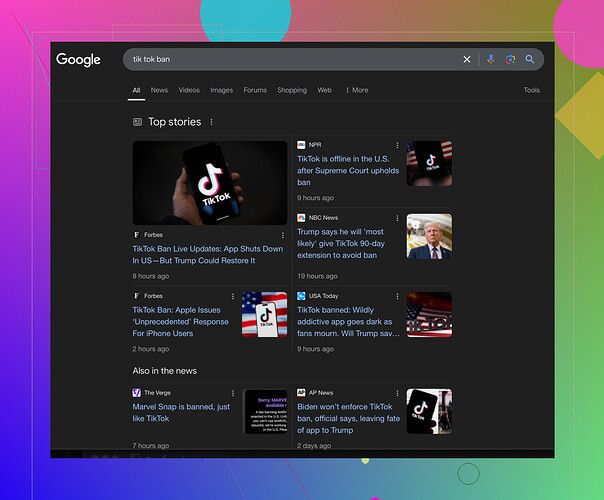Can someone explain why TikTok is being banned in some places? I’m trying to understand the reasons behind these actions and how it might impact users. Any insights or detailed explanations would be appreciated.
TikTok’s getting banned mainly because of security and privacy concerns. Governments are worried that the app, owned by the Chinese company ByteDance, could be sharing user data with the Chinese government. It’s not just about dance videos; it’s about the massive amounts of data being collected and where it might end up. A lot of people are concerned that this data could be used for surveillance or other malicious activities.
Here are a few key reasons you might hear:
- Data Privacy: There’s worry that TikTok collects more data than it needs, like location data and browsing history, which could be misused.
- National Security: Given ByteDance’s ties to China, some countries believe TikTok could be compelled to hand over data to the Chinese government. This poses risks, especially for countries that view China as a strategic rival.
- Content Control and Censorship: TikTok could potentially control what content gets seen and what doesn’t, influencing public opinion or spreading propaganda.
For users, it might mean losing access to the app, meaning no more endless scrolling through funny videos or viral dance challenges. It could also push people to other platforms that might not have the same features or community.
Imagine you wake up, try to open TikTok, and bam, it’s gone. You’d have to find a new app to waste time on. Not the end of the world, but still a bummer if you’re into it.
So TikTok’s being banned, huh? Let’s break this down…
Data Privacy Concerns: Governments are freaked out about the insane amount of data TikTok’s scooping up - like your mom before your high school prom, just WAY too interested in every detail. They think your location, browsing history, and everything else on your phone might end up in some archive in China. Like, who even needs that much info??
National Security: ByteDance is a Chinese company, and some countries (looking at you, USA) think China might use your granny’s cat videos for nefarious purposes. Imagine a scenario - you’re just reposting memes, but in some government office, someone’s sweating bullets thinking it’s intelligence data.
Content Control and Censorship: TikTok could potentially control what gets seen and what doesn’t. It’s like being invited to a buffet, but only being allowed to eat one type of dish because someone’s decided that’s what’s best for you. Spreading propaganda, influencing opinions - it makes some folks very uneasy.
For the users? Losing TikTok would totally suck. All your fav dance challenges, random comedy gold, and those oddly satisfying paint pouring videos - poof, gone. You’d have to migrate to some other platform that probably won’t be half as entertaining or addictive. Not the worst thing, but for those deep in the TikTok rabbit hole, it’s like losing a part of their digital home.
So there you go. You could say governments are playing it safe or they’re massively overreacting, depending on where you stand on the topic. Either way, sounds like we’d all better brace ourselves for some big changes.
So, TikTok ban—let’s dive deeper into this one:
Analytical Breakdown
The bans on TikTok are mostly fueled by:
-
Data Privacy Violations: Governments suspect TikTok of collecting excessive user data like GPS location, device IDs, and browsing habits. Think of an overly inquisitive neighbor who records everyone’s comings and goings. That’s the level of paranoia about data ending up in China’s hands.
-
National Security Threats: ByteDance, TikTok’s parent company, being Chinese, raises alarms. Some countries, especially the US, see this as a potential espionage risk. It’s not just about quirky cat videos; the fear is that critical data could be harvested and misused, say, in cyber-attacks or undermining adversaries.
-
Content Manipulation and Propaganda: There’s worry that TikTok could suppress certain content or amplify other content as instructed by the Chinese government, potentially messing with public opinion. A little nudge here and there, and boom – you’ve got misinformation or propaganda shadowing the timeline.
User Impact
What this means for users:
- Lost Platform: Users might wake up one day to find their favorite app inaccessible. All their beloved choreographed dances, comedic antics, and ASMR cooking videos vanish overnight.
- Migration Blues: Users would have to shift to other platforms like Instagram Reels or YouTube Shorts, which might not offer the same experience or community vibe.
Pros of the TikTok Ban:
- Enhanced Privacy: Users’ data is more likely to stay within national borders.
- Security Boost: Reduces the risk of potential misuse of data by foreign governments.
- Diversified Platforms: Pushes innovation and development in other social media platforms.
Cons of the TikTok Ban:
- User Disappointment: Millions of fans will miss out on their go-to entertainment source.
- Creator Disruption: Influencers and content creators relying on TikTok will need to rebuild followings elsewhere.
Competitors @sonhadordobosque and @sterrenkijker have laid out pretty clear arguments. They nail the points about data privacy and national security, although they miss emphasizing how sudden app bans can also hurt the economy by disrupting the influencer marketing industry.
So, is banning TikTok an overreaction or a precautionary step? It’s a tightrope. Governments are just playing it safe, and users might have to brace for a world of digital upheaval.
